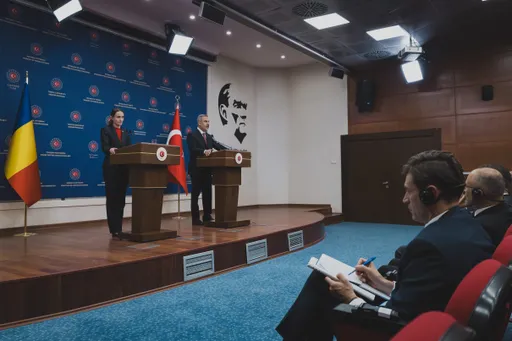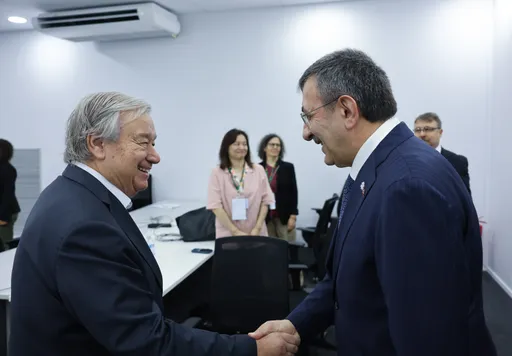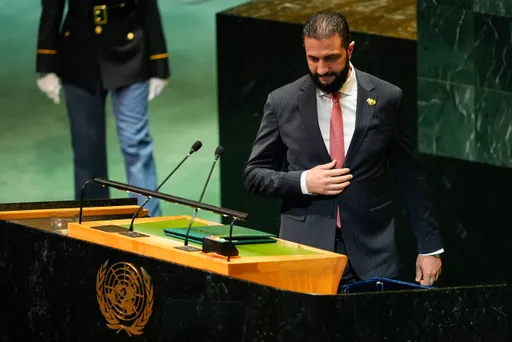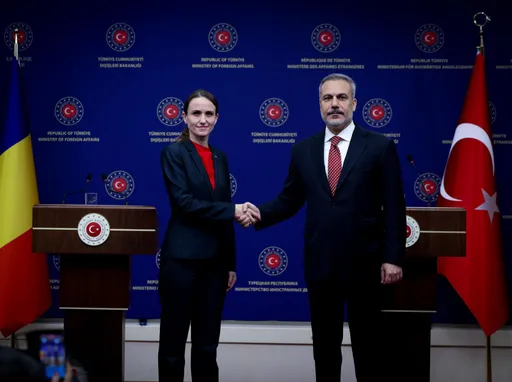Unlike the West which calls Hamas a terrorist organisation, China sees the group as a representative of the Palestinians’ struggle for independence.
China’s stance on the October 7 attack is also different from that of the Western states, which have failed to stop Israel’s decades-long occupation, illegal settlements, and constant provocations.
After the October 7 attack, China did not rush like many Western leaders to condemn Hamas. Instead, it urged “relevant parties to remain calm, exercise restraint, and immediately end hostilities,” showing its different approach towards the Palestine-Israel conflict.
The United States and its Western allies have done little to stop the continuing Israeli onslaught on Palestinians. But China alongside countries like Russia and Türkiye have urged an immediate ceasefire.
The US role in the Gaza war has been particularly notorious. It has continuously rejected ceasefire calls from China and other states, even vetoing UN resolutions to end the bloodshed in Gaza.
"It's extremely disappointing and regrettable that a UN Security Council draft resolution demanding an immediate humanitarian ceasefire in Gaza was vetoed," Zhang Jun, China's permanent representative to the UN, wrote on X last month.
China, which has long advocated a two-state solution, has also urged the UN Security Council to take immediate action to develop a “concrete” roadmap, leading to a "comprehensive, just and lasting" settlement between Israel and Palestine.
Beijing’s current approach towards the Palestinian conflict has evolved over the decades since the communist takeover in 1949. Let’s look closely at how China’s connections with the Palestinian resistance groups have unfolded over the decades.
From the 1940s to 1970s
Israel was established in 1948, one year before the end of the Chinese Civil War heralding the victory of the Chinese Communist Party (CCP) under Mao Zedong against the Nationalist Party led by Chiang Kai-shek, who later moved to Taiwan and became its founding father.

Communist leader of China, Mao Zedong, waves to crowd in Peking, China on August 30, 1966.
Under the Nationalist rule, Beijing abstained from the 1947 UN vote that led to the creation of the Jewish state in Palestine but recognised it in 1949. However, Beijing’s relatively positive approach towards Israel dramatically changed with the CCP’s coming to power.
Mao saw Israel as part of the Western hegemony's Middle Eastern project, likening it to Taiwan, a West-backed political entity. “Imperialism is afraid of China and of the Arabs. Israel and Formosa [Taiwan] are bases of imperialism in Asia,” he famously told a Palestinian Liberation Organisation (PLO) delegation in 1965.
The CCP under Mao provided strong backing to the Palestinian resistance groups from Fatah, a nationalist and social democratic movement, to the Popular Front for the Liberation of Palestine (PFLP), a communist party with Marxist-Leninist leanings, and the Democratic Front for the Liberation of Palestine (DFLP), another communist party with both Marxist-Leninist and Maoist leanings.
In 1965, China’s support for Palestinian resistance became official as the PLO under Fatah's leadership opened a diplomatic office in Beijing. Fatah leaders from Yasser Arafat to Salah Khalaf (Ebu Iyad) paid visits to Beijing to meet top officials of the CCP.
Prior to the disastrous Six-Day War of 1967, Arafat went to Peking twice in 1964 and 1966, wrote Salah Khalaf, one of Fatah’s co-founders and Arafat’s deputy, in his book Palestinien sans patrie [Palestinian without homeland], which is based on interviews with French journalist Eric Rouleau.
While the Six-Day War was disastrous for the Arab world, it also helped Fatah and other Palestinian resistance groups understand their own political reality and the importance of self-reliance. The PLO developed a strategy of forming direct connections with countries like China, according to Khalaf.
“Since 1968, many Palestinian fedayeen (fighters ready to sacrifice their lives) had begun receiving military training in China,” said Khalaf.

Fatah fighters of the Palestine Liberation Organisation (PLO) reading copies of Quotations from Chairman Mao Zedong or 'Little Red Book' in Jordan in 1970. (X)
During a critical February trip in 1970, both Arafat and Khalaf met Zhou Enlai, the first premier of the People's Republic of China (PRC), who had served in this capacity for more than two decades until his death in 1976.
“Zhou’s questions to us not only revealed his deep love for the Palestinian people, but also demonstrated his deep knowledge of the (Palestinian) problem and its regional and international scope,” said Khalaf.
During the meeting, Zhou assured Fatah leaders of Chinese support, asking for their clear demands, according to Khalaf. “The next day as soon as we arrived at the Chinese defence ministry, we were told that all of our demands on both civilian and military issues were accepted by Beijing,” he said.
Between the late 1960s and mid-1970s, China provided nearly $5 million, which is equal to about $33 million in current terms, to Palestinian resistance groups. In 1974, the PLO’s office in Beijing was upgraded to an embassy, showing China’s increasing backing of the Palestinians.
The next year, China backed UN General Assembly Resolution 3379, which equated Zionism with racism and discrimination. Until the 1980s, China even refused to grant visas to Israelis if they did not hold another passport.
China’s realignment with Israel
The diplomatic normalisation process between the United States and China in the early 1970s, engineered by then National Security Adviser Henry Kissinger, hit Beijing’s ties with Palestinian groups.
In 1971, the PRC claimed its membership in the United Nations, replacing the Nationalist Party-ruled Republic of China and becoming the sole legal representative of China across international organisations. The same year the PRC also claimed permanent membership in the UN Security Council, reinforcing its heavyweight position across the globe.
All these developments alongside the US-China rapprochement impacted Beijing’s assessment of its priorities on issues like the Palestine-Israel conflict, making the country embrace a political pragmatism based on economic growth and international diplomacy.

Then Chinese communist party leader Mao Zedong, left, and then US President Richard Nixon shake hands as they meet in Beijing on Feb. 21, 1972. (AP)
This approach also led to increasing contacts between Israel and China, which relatively reduced its support for the Palestinian cause. With the death of Mao in 1976, Palestinians also lost a big anti-imperialist ally. Beijing moved away from Mao’s ideological stance and towards political pragmatism.
When the PRC and the United States restored full diplomatic relations in 1979, Beijing and Tel Aviv also began developing some secret ties on political and military issues. Despite this rapprochement, China recognised in 1988 the State of Palestine after the PLO’s independence declaration in November, showing that it continued to be supportive of the Palestinian cause.
But in 1991, China abstained from the critical vote on UN General Assembly Resolution 46/86, which overturned Resolution 3379. It was considered a victory for the pro-Israeli Western bloc. The next year, Beijing established full diplomatic relations with Israel, increasingly appearing to assume a neutral position on the Palestine-Israel conflict.
The China-Israel rapprochement showed its results in financial terms. Bilateral trade volume increased from $50 million in 1992 to over $10 billion in 2013. China currently comes only second after the United States in terms of collaboration with Israel’s high-tech firms.
During the Oslo peace process between the PLO and Israel, which produced two accords in 1993 and 1995, China backed the talks, offering its mediation to address the longstanding conflict.
Despite China’s realignment policy with Israel, its approach towards Palestine had been starkly different from the West's overt support for Israel through the 2000s and early 2010s.

Then-Chinese president Jiang Zemin, left, listens to then Palestinian leader Yasser Arafat during a meeting at Arafat's headquarters in the West Bank town of Bethlehem, April 15, 2000.
In 2006, China invited Palestinian Authority’s Hamas-backed foreign minister Mahmoud al-Zahar to a China-Arab Cooperation Forum despite protests from the United States and Israel. In 2010, China asked Israel to lift its brutal air, land and sea blockade on Gaza.
Under Xi Jinping
Since Xi came to power in 2013, he has reportedly worked to revive some of Mao’s ideological stance, China has reasserted some of its pro-Palestinian positions, including the country’s support for "the establishment of a Palestinian state with its capital being eastern Jerusalem".
In 2017, China’s UN envoy disclosed Xi’s four-point peace plan, which called for the two-state solution, ending illegal Israeli settlement policies, coordinating “peace-promoting measures that entail joint participation at an early date” and promoting economic development and cooperation between Palestinians and Israelis.
The same year China organised a peace conference between Israel and Palestine to seek a solution to the conflict, but the meeting ended without any concrete resolution.
Xi’s Palestine approach has been also largely embodied by BRICS, a non-Western alliance, which has recently expanded by accepting new members like Saudi Arabia, the United Arab Emirates and Iran.
Analysts believe that in the wake of the ongoing Gaza war, Xi’s sympathy for Palestine has been reinforced by Beijing's fears of a regional war across the Middle East, which can hit Chinese economic interests.
“There are serious concerns among policymakers in Beijing about this fighting in Gaza and Israel spreading to other parts of the Middle East,” said Giorgio Cafiero, CEO of Gulf State Analytics, a Washington-based geopolitical risk consultancy.
“China has many economic interests in the Middle East, and Beijing always viewed instability in this region as a major threat to Chinese interests.”




















